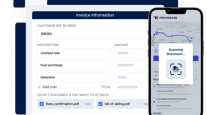PeopleNet, Motorola Partner on Mobile Fleet Management
This story appears in the June 24 print edition of Transport Topics. Click here to subscribe today.
PeopleNet Communications Corp. has begun offering its fleet management applications on handheld mobile computers from Motorola Solutions Inc., expanding the lineup of rugged handheld devices compatible with its platform.
Through the new integration, PeopleNet customers have the option of using Motorola’s MC75A handheld computer as the sole display for their onboard computing systems.
“It allows for our full feature set to run in conjunction with a proof-of-delivery app or a personally enabled application on that handheld device,” PeopleNet President Brian McLaughlin told Transport Topics.
Since August, PeopleNet also has offered compatibility with devices made by Intermec Technologies Corp., namely the CN50 and CN70 handhelds.
McLaughlin said PeopleNet plans to continue adding certifications for more rugged, enterprise-grade handhelds in the future.
“Our focus right now is adding a new one every quarter,” he said.
Demand also may be as rapid, considering the increasing presence of such devices as smart phones and computer tablets for everyday use.
Therefore, integration of handheld devices for businesses such as trucking gives fleets another way to configure their onboard systems, apart from the tablet or traditional fixed display that PeopleNet also offers.
“Our goal is to add more and more options for our customers,” McLaughlin said, adding that PeopleNet will support the system on customers’ behalf, whether they choose a mobile or fixed in-cab display.
McLaughlin said 90% of the demand for handheld integration relates to proof-of-delivery requirements.
“If you need to capture signatures or information at the point of delivery, then you’re more likely to be interested in a handheld device,” he said.
The customers that have been gravitating to the handhelds generally have been less-than-truckload carriers and “multistop, multi-drop” operations such as food-service and building-supply fleets, as well as direct-to-store delivery, McLaughlin said.
PeopleNet said its handheld integrations enable a company-owned, personally enabled ownership model, also known as COPE, where a company buys and owns the devices but the employee is allowed to install applications for personal use on the device. The company also establishes use and cost thresholds for employees under this model.
With its new handheld options, PeopleNet is offering rugged handhelds designed for the business environment but has not moved to offer integrations with smart phones or other consumer-grade devices.
McLaughlin said there are “too many concerns right now” about the durability of consumer devices.
Enterprise-grade devices also offer greater security, said Mike Maris, senior director of transportation and logistics at Motorola Solutions.
“People are buying our products because they know they can secure the device, and they can secure the data that goes back and forth,” he said. “If that device gets dropped or left behind, they can shut it down and do a lot of things to prevent it from getting into the hands of someone who might try to enter their system.”
Maris said fleets’ interest in using handhelds in their operations has risen as people have become more accustomed to using consumer smart phones in their daily lives.
“It’s not foreign like it used to be,” he said. “We have definitely seen a growing interest. We see a nice, steady growth in business in this area for the next few years.”
A second Motorola device is in the certification process for integration with PeopleNet, Maris said.




